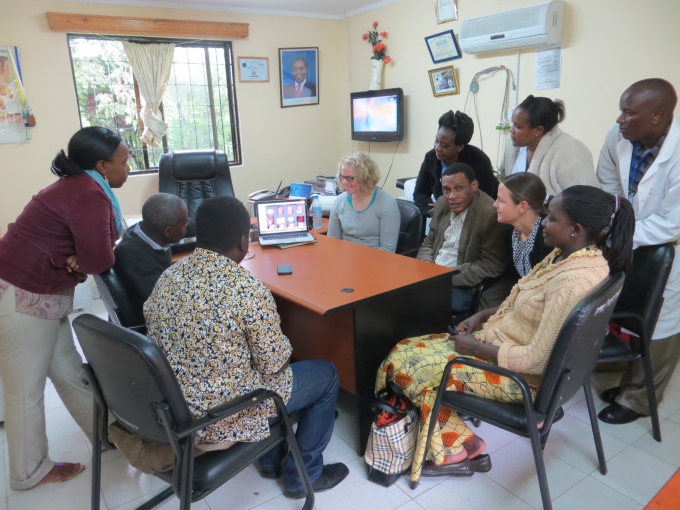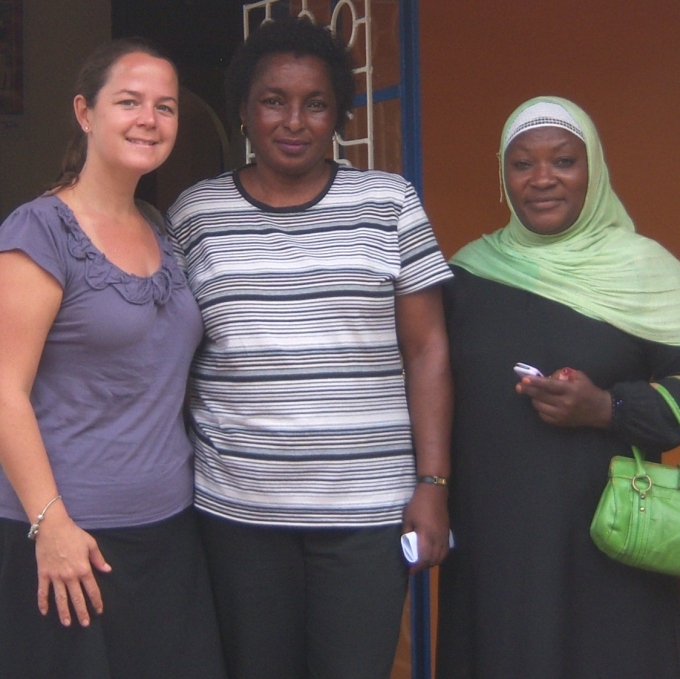Tackling inequality in Tanzania
June 16, 2014
Share
By Anne Craig, Communications Officer
She might work at Queen’s, but Karen Yeates’ heart is in Tanzania. She is using mobile phone technology to improve health care and save the lives of women and children living in the African country.
“I started volunteering in Tanzania in 2006 and found that women are often forgotten in countries like this,” says Dr. Yeates, co-director of the Queen’s School of Medicine’s Office of Global Health. “I wanted to help make a difference. The inequality in health care made me angry. It’s not rocket science but we still can’t figure it out.”
 Karen Yeates meets with workers at a medical clinic in Tanzania to explain the bed nets program.
Karen Yeates meets with workers at a medical clinic in Tanzania to explain the bed nets program.Dr. Yeates’ first research project in Tanzania was implementing a cost-effective method of screening for cervical cancer using a cellphone. The Kilimanjaro Cervical Screening Project was funded by Grand Challenges Canada as part of the Rising Stars in Global Health program.
With that project wrapping up in July, Dr. Yeates is working with the Ontario-based Mennonite Economic Development Associates (MEDA) to distribute insecticidal treated bed nets to pregnant women and determine why only 70 per cent of women are putting the nets on their beds. Pregnant women and children under the age of five are at the most risk of dying from malaria in developing countries.
“When the pregnant woman receives the voucher number for her bed net, her mobile number is recorded and entered into a server that will track the redemption of the net voucher and will also send her text messages to remind her to redeem the voucher and pick up her net if she hasn't done so,” explains Dr. Yeates. “She will also get health promotion messages to encourage her to use the net properly, on her bed where she and her children sleep.”
Seven million bed nets have been distributed in Tanzania through this e-voucher program.
 Karen Yeates (l) says the nurses in the clinics are critical for the success of the e-health programs.
Karen Yeates (l) says the nurses in the clinics are critical for the success of the e-health programs.Researchers can also track where the bed net vouchers are being redeemed and can match that against malaria hot spots. A second Grand Challenge Canada grant and MEDA funding will help move this phase of the research project forward.
“Cellphones are ubiquitous in countries like Tanzania, they live their lives through their cellphones,” says Dr. Yeates. “It only made sense to use the technology to improve health care. People in Tanzania don’t have paper medical records but we can work toward those records being stored right on their phones. There is so much more we can do.”
Dr. Yeates' work in Africa continues. She is also studying the rapidly rising rates of chronic diseases such as high blood pressure. She and colleagues will use the same mobile phone technology in a clinical trial to distribute subsidized blood pressure medications to those who cannot afford them. The patients will also receive text messages about their blood pressure and how to improve the disease to prevent long term complications such as stroke, heart and kidney disease.